“We have to think about the whole jumping the horses in a very systematic form. Horses want to do the right thing, we just have to think about how we can put them in a situation that they can do that for us. So for me, it’s quite basic and it shouldn’t be complicated. The most important thing about it is having a good quality to your canter and the horses being able to understand and are ready for the questions that we’re asking of them, and then we kind of can go from there..”—Eventer Tim Bourke
Welcome to the Practical Horseman Podcast, featuring conversations with respected riders, industry leaders and horse-care experts. The show is co-hosted by Practical Horseman editors and our goal is to inform, educate and inspire. I’m Sandy Oliynyk. And this week’s episode is with Irish eventer Tim Bourke.
Listen to the podcast with Tim Bourke here.
I’m excited to bring you this episode with Tim. I didn’t know too much about him as a person until we spoke on the phone in mid-February. His resume, which I’ll get to in a moment is impressive. But it was his answers to so many of my questions that I found really insightful and interesting. I love how Tim speaks about the horse who took them around the Kentucky three-day event several times Luckaun Quality. When Tim talks about him, I think you can really hear the admiration, the gratitude and the affection that he has for Obie. I also like about how he spoke of what he learned from one of his early mentors Bruce Davidson and how he didn’t even realize how much he had learned until looking back.
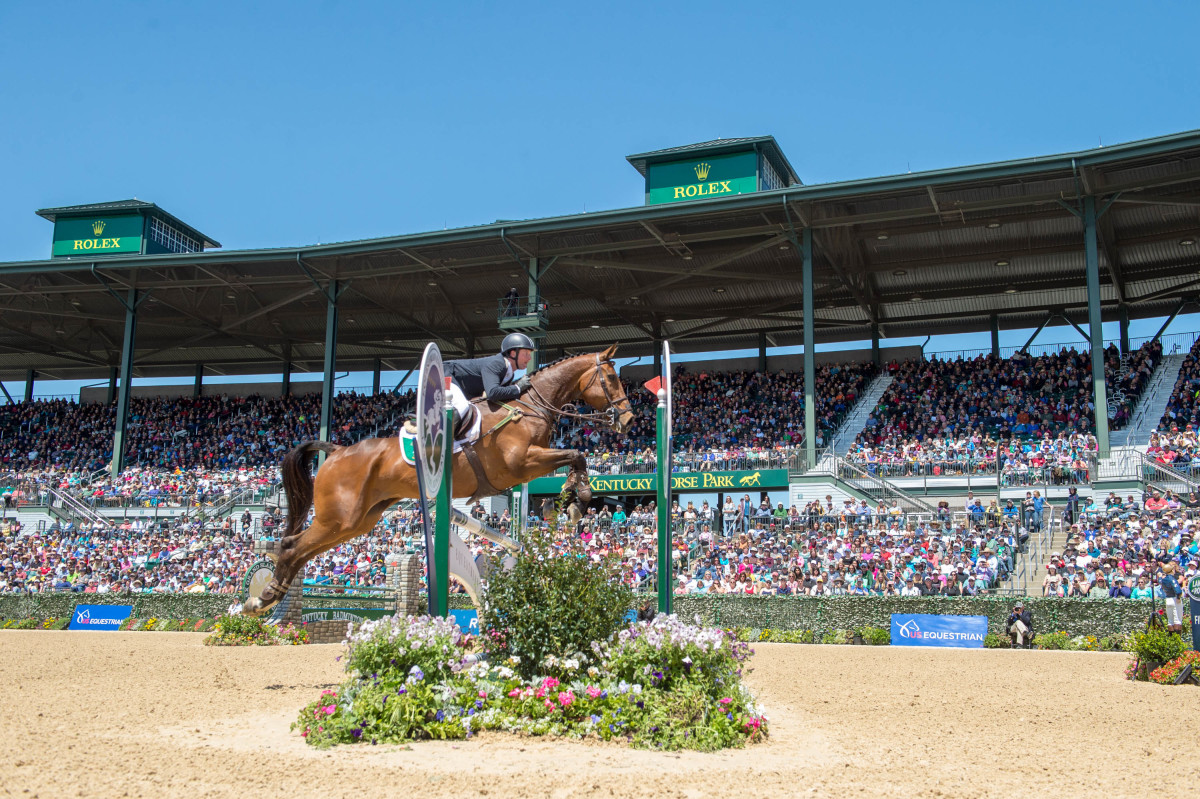
Tim also mentioned that he’s now learning more than he ever has from Olympian David O’Connor, but points out that it might be because he’s at a stage in his riding where he’s ready to hear the information. I think that’s such a truth for many of us. We can learn only what we’re ready to mentally, physically, and emotionally.
You’ll also find out more about Tim’s training philosophy, which you heard in the opening quote, like his systematic approach to things. This seems to be a highlight of his program, along with keeping things basic and not complicated, which I know for me is always a good reminder. Those are just a few tidbits that you’ll glean from this interview. To fill you in on some background about Tim, he grew up in Ireland and inherited his love of horses from his grandmother. He achieved an, a rating in pony club and later attended Gurteen Agricultural College for equine studies in business. Upon graduation, Tim traveled to the United States to work for Bruce for two years. Tim also worked for event or Sharon White for about six years before opening his own stable Stone’s Throw Farm in 2014 in Berryville, Virginia, with his wife Marley Stone Bourke also an eventer.
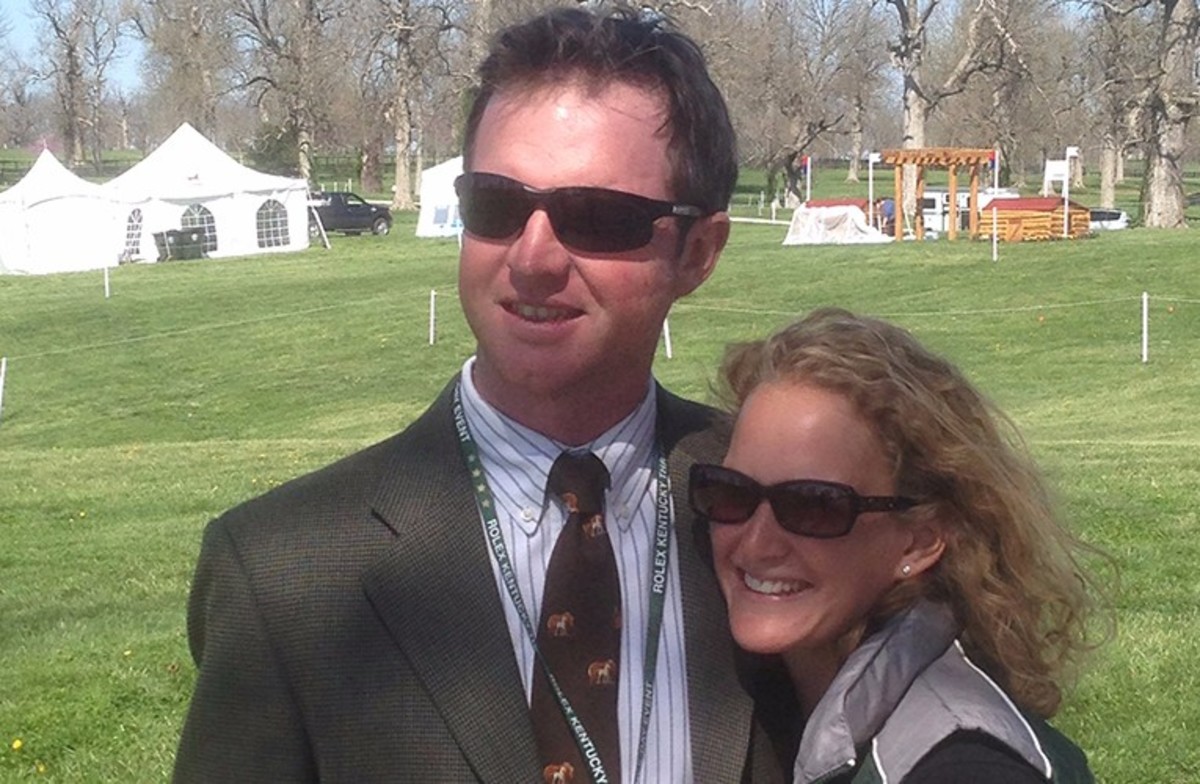
It is out of Stone’s Throw that they operate their riding and training business, Bourke Eventing. Tim rode Obie at the Kentucky Three-Day Event five times. Four of those times, they finished in the top 20 and two of those times they had the fastest cross-country time of the day, attesting to Tim’s description of Obie as a cross country machine.
They also keep competed at the Burley Horse Trials in 2015. And in 2018, they were named the traveling alternates for the Irish Eventing team at the World Equestrian Games.
Before getting into the conversation, I’d like to thank the sponsor of this week’s podcast, Kentucky Performance Products, and share their message.
The horse that matters to you matters to Kentucky Performance Products, because KPP is owned by horse people exactly like you. Each KPP supplement is crafted using research proven formulas and high quality ingredients. We are always available to help you choose the best supplement to fit your horse’s lifestyle.
To learn more, visit kppusa.com. To find KPP on Facebook and Instagram, search #KPPUSA. For nutritional supplements you can count on trust Kentucky Performance Products. Now let’s jump right into the conversation with Tim, where he first shares how he got started in riding.
[00:04:49] Tim Bourke: I started from a young age, pretty much. When I was growing up, we grew up in a town in the West of Ireland called Westport. And my grandmother had a riding school and we used to take tourists out for trail rides. And we had like a pony club and gym kind of and stuff like that. So, you know, we grew up riding from day one really. That was it, you know. We got going and we didn’t actually have any form of formal education with riding. It was all very much like going by the seat of your pants and a lot of bareback riding and just general stuff like that.
Sandy Oliynyk: And what was it about horses and the sport that drew you in?
[00:05:32] Tim Bourke: I don’t know. I always had a love for horses. I didn’t know what direction it was going to actually take me in my life. I just knew that it was going to be something or I hoped it was going to be something with horses. So, you know, in growing up through high school, started into the local pony club and ended up at a show barn. Philip [00:06:00] Scott’s place and he was really good to me and helped me get through a bunch of my pony club exams and got me started in this. And then, you know, going to college, I decided that there was, there was an agricultural college and I liked to course in it. It was equine through business and, you know, we learned all about the business side of things and a lot of practical stuff. So that was something that I loved, really got stuck into and it was good when we were there. I worked at a couple of different places, you know, trying to fund my way through college a little bit.
So worked in it in a big dealer’s yard and got plenty of experience riding all types of horses there. And then got a job for a guy called John Craig who bred quite a lot of real good event horses. And he got me into eventing and gave me a bunch of young horses to get started on. That was my real introduction to eventing and from there I kind of loved it, you [00:07:00] know? So, it came time to graduate from college and wondering where I was going to go. I always thought I’d go home to Westport and start up my own business and have a barn from there.
As it happens, I said, okay, well, I’ll go abroad for six months or a year and try and work somewhere and see how that goes. Get some mileage and then go home from there. That’s what brought me to the States. One of my tutors knew Bruce Davidson through just a mutual friend.
And she got me a job working for Bruce and I came over for two years. It was great. And then, went back to Ireland for, I think it went back for almost a year. My now wife Marley, was in college at the time and she transferred and went to Ireland for a year. And, we were there, that was good.
And then we came back to the States, worked for Sharon for six or seven years, Sharon White for six or seven years. And then we started up our own business. So, that’s really the whole story behind it all.
Sandy Oliynyk: What was it? And what is it about eventing that you like say compared to show jumping?
[00:08:10] Tim Bourke: Well, if you think about the background that I grew up in, it was a lot of like out riding across fields and jumping stonewalls and, you know, anything we could dare ourselves to do, we did. And that’s sort of where the thrill of it came from. And I think, my strongest suit is cross-country country. It’s the part that I liked the best. So, you know, you have to suffer through a little bit at the dressage to get to the bit you want.

Sandy Oliynyk: So when you returned to Ireland, after working for Bruce, that led to you meeting your top horse Luckaun Quality?
[00:08:45] Tim Bourke: Luckaun Quality, yeah. I went to work for the Reapes. They have a big show jumping facility. Jonathan now is one of my best friends. It’s where all of my horses come from is from Jonathan. So we struck off a pretty good relationship. I went and worked there for a little while when I was in Ireland and I ended up breaking Obie as a three-year-old. I got him going and you know, it came time to go back to the States.
I went back and a couple more months later, they gave me the horse and let me take the horse over here. That’s really where it started with him.
Sandy Oliynyk: Can you talk about Obie — What he’s like to ride? What, what makes him a special horse?
[00:09:27] Tim Bourke: He’s a machine. He is an absolute machine. He was never the best on the flat and he was always a little bit strong. But I think looking back at that time in my career, I think it was probably the best horse you could ever imagine. There was a little bit of a pigheaded from him and a little bit of pigheaded from me. And, you know, he was so talented. It was all raw talent with that horse.
There was never a question that he, that he would ever say no to. And, you know, I think a little bit of naiveness on my part was, you know, you just pointed him at something and he went and did it. And he brought me so far, so, so quick. We did Kentucky five times, we did Burley.
He’s an amazing, amazing horse. Back in 2018, right before the World Games, we were shortlisted to go for Ireland to Tryon. And he unfortunately got EPM during the summer right before the Games. Just came up lame behind. Wasn’t quite neurologic and then ended up having some muscle atrophy behind. Unfortunately, ended his career a little bit early, but you know, I owe everything to that horse.
Now he’s come back and he’s get going again. And, my groom, Catherine, rides him and she took him to her first jumper show at Bruce’s Field the other week and jumped around the 1.10s and the horse is happier than ever to be out and doing something and back at it. For me, it’s so nice to see him having a new job, a new lease on life and being able to, you know, still have purpose.
Sandy Oliynyk: And I thought it was fun, I was reading on your website a little bit about him and you had something that he quacks like a duck while being tacked up. He sounds like a character.
[00:11:11] Tim Bourke: He did that for a long time. And then after he got tieback surgery, after the first Kentucky, it sort of petered out a little bit.
I don’t know if the tieback surgery affected his quacking but, you know, he’s definitely a personality, that horse. His favorite thing is peanut butter sandwiches.
Sandy Oliynyk: So you, you mentioned, you know, that dressage wasn’t his favorite thing? How did you work to make that better?
[00:11:37] Tim Bourke: That’s a good question. I don’t know. He’s such a clever horse, or like he frustrates you to the last and always in building up to the big shows he was terrible. He was horrible. If you’re trying to do some dressage and he’d be just looking at you straight in the eyes with his head up. He did what He wanted to do, but it was quite interesting.
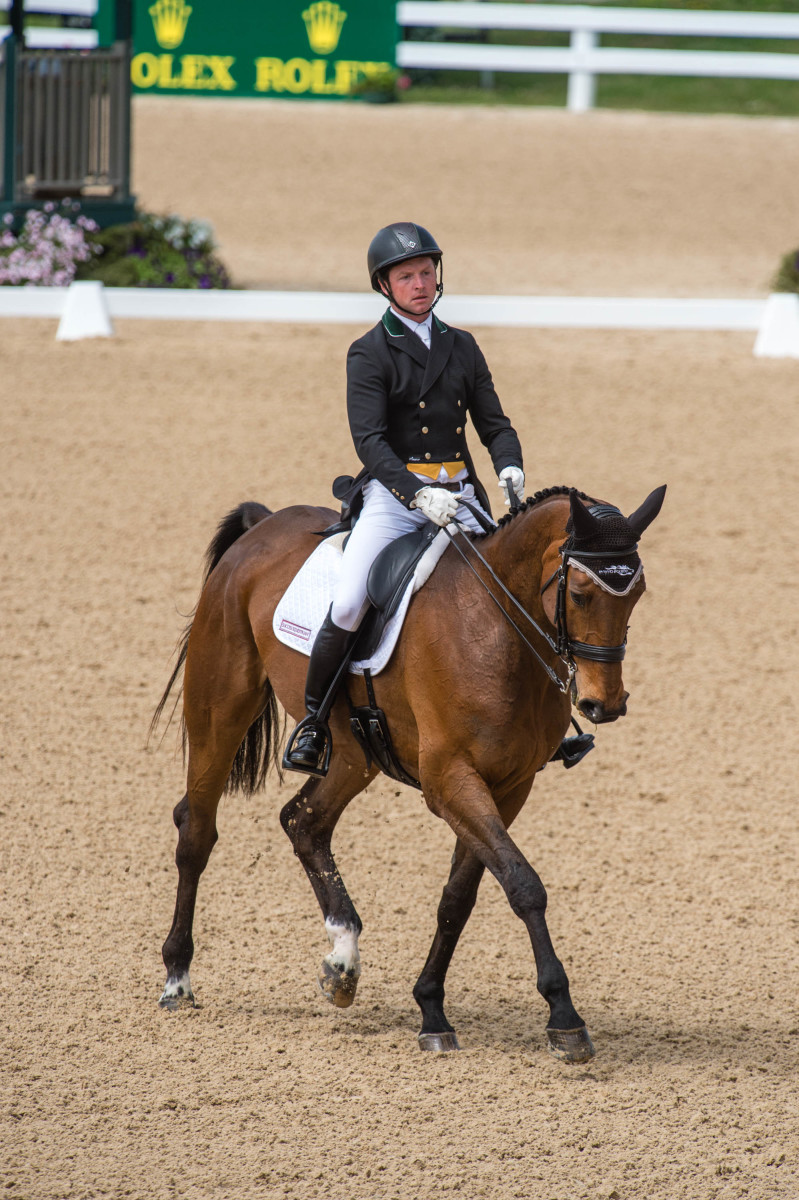
He always came out on the big days and actually gave me [00:12:00] a pretty okay test. Like, I think each year at Kentucky he put me around the middle of the field. Which for him was fine. Cause if you stayed on us, you were going to finish up there. So, you know, with him giving you the mediocre dressage tests, which was like winning the lottery with him, was awesome.
And then you could rock around the cross country. I think he was the fastest time at Kentucky three years in a row. Like he was just an out and out machine cross country. And then going and try and leave the polls up in the show jumping it put us in the top 20 several times there. So, you know, it was something that was manageable, put it that way.
Sandy Oliynyk: Now, when you were at Bruce’s, you know, is there anything that stands out in terms of what you learned from him?
[00:12:50] Tim Bourke: Bruce is an amazing, amazing, amazing man. There’s parts of my riding that I’ve picked up there that I didn’t even know about. Like years later, you’d go back and you look and you see like… I have a habit in cross-country where I bridge my reins all the time and I just put my hands down, bridge my reins and let the horses run a little bit. And then you use your body more than your hands to change the balance in front of the fences. I never knew I did it. And then one day I was just riding around, and I was like, look down and just bridging my reins and here I’m going. I went back to Bruce. I saw him at plantation. I said, Bruce, you know what I do and never knew I did it — I bridge my reins all the time, I wonder where I got that from. And he just laughed at me.
That man was so gifted cross-country it was a pleasure to watch him go. And you pick up on little things that you don’t even know about. You know, I will say all the time, there are people say, Bruce is a hard man to work for, and all the rest. Bruce was unbelievably good to me. And I think once you figure out why he’s there and what he wants you to do, you can stay ahead of it.
And, you know, he’s there for the right reasons. And when the man stops yelling at you, you know, there’s something wrong. So I was very, very appreciative of my time there.
Sandy Oliynyk: And I guess a similar question about your years with Sharon, you know, what was it like to work for her and what did you learn from her
[00:14:20] Tim Bourke: Sharon and I now have farms that are, I think we’re at that a mile apart, she’s on the West Virginia side of the line and we’re on the Virginia side of the line and Sharon’s like a big sister to me.
Like there’s, there’s nothing that lady would ever not do for me and vice versa. And it’s a relationship that’s gonna last forever. She’s always gonna be there for me and the same, you know. What I learned there? I think everything, you know, the opportunities that she gave the instructors that she brought in, the instruction that she gave. It kind of molded me into what I’m now, you know. Jimmy Wofford was there all the time. Linda Zang was there all the time. You know, you couldn’t ask for better support and help than that, you know? And even now when it comes to the big shows, we’ll get together and walk around the cross country course.
And there might be 10 words between us going round. Like both of us know what each other’s thinking. It’s just reassuring to have someone that you can walk around one of those big courses and not be baffled by too much information. And you personally, you know your own horse pretty well, and you don’t want to change from what you’re naturally gonna do.
You know, I think it’s just, just a little bit while I’d watch this or I’d watch that. And, you know, it’s a really good relationship that we have.
Sandy Oliynyk: Have there been any other mentors who’ve influenced your writing and how so?
[00:15:52] Tim Bourke: Oh, that’s a tough question. It’s been a lot of them, a lot of them.
Right now, I’ve been riding quite a lot with David O’Connor and I think [00:16:00] it’s made a massive difference to me at this point in my career. I don’t know if it’s that eventually I’m ready to hear the information and educated enough to be able to let some of it sink in. But I do feel right now that I’m getting some of the best instruction that I’ve ever gotten.
Going through the show jumping, like when I was in Ireland, Jonathan was very good that he helped me so much with my show jumping. So that was good. And then another Irish guy, actually, Brian Murphy, when I was over here, he’s a really, really clever guy. And he helped me quite a lot with my show jumping for a long time.
There’s been many, many great people that have contributed through the years.
Sandy Oliynyk: And we’ve of course spoken about Obie but, have there been any other important or influential horses in your life?
[00:16:50] Tim Bourke: You know, he was the first, and no one’s ever going to be able to take that away from him.
I feel like right now I’ve got probably one of the best groups of horses that anyone could ever imagine. I’ve got this little mare called Quality Time and it’s just a machine. It’s the most amount of fun to ride every day. She might not be the flashiest mover, but she’s the cleverest jumper and she’s so good cross country.
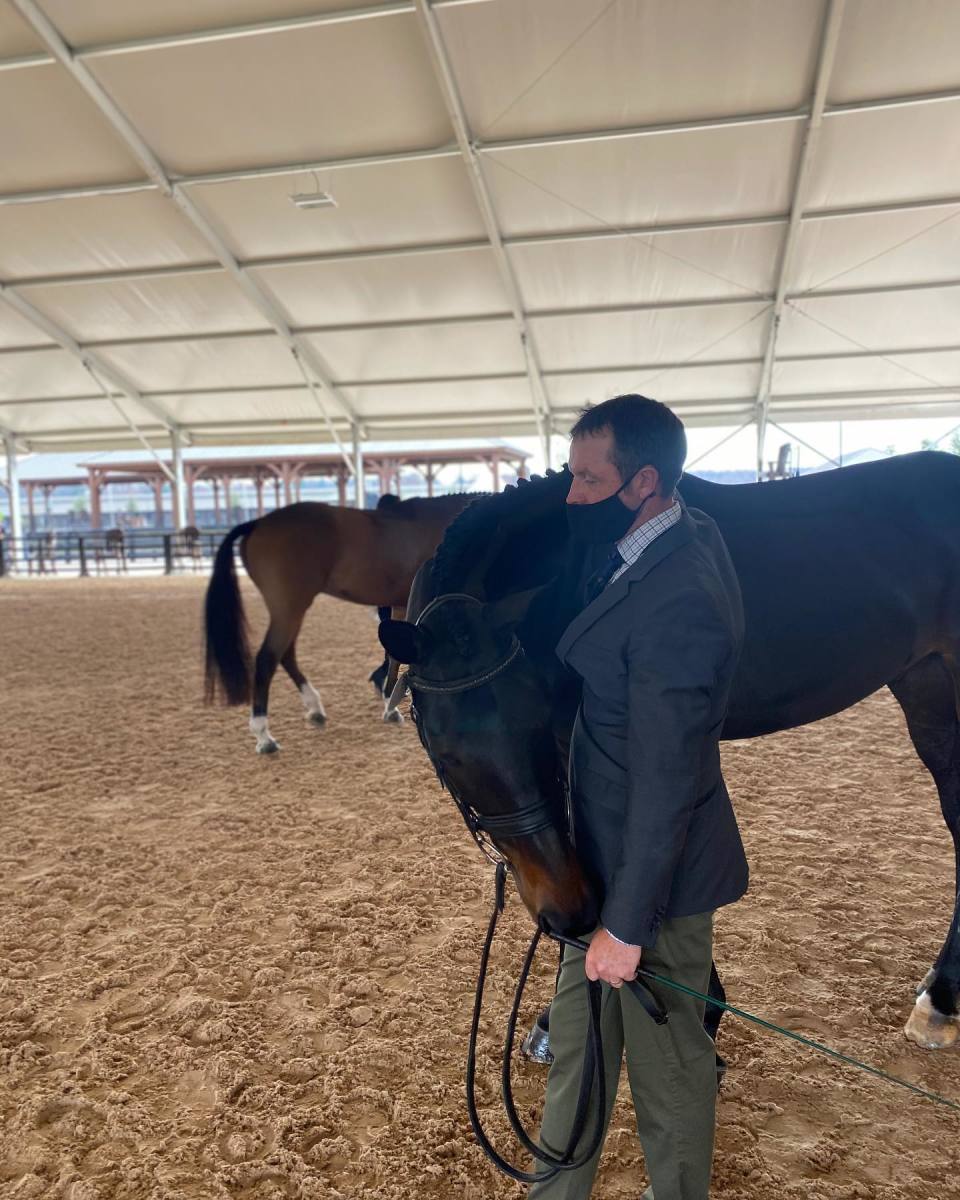
And then a couple of young horses coming through to watch out for. I have a mare called Quality Obsession, I think is probably one of the most talented horses that I’ve ever sat on. Another lovely horse called Quality Explosion, all horses that came from Jonathan. I think in the next couple of years, you’re going to see a few of them, hopefully make it to the top of the sport and, keep us going in the same direction.
Sandy Oliynyk: Moving on to talking a little bit about training and riding, could you describe your overall training philosophy?
[00:17:52] Tim Bourke: This is a question that comes in at the start when I’m away teaching or I teach a clinic or you meet new people. The first thing that I’ll always say is that my philosophy doesn’t change between riding or teaching.
I think that we have to think about the whole jumping horses in a very systematic form. Horses want to do the right thing, we just have to think about how we can put them in a situation that they can do that for us. So for me, it’s quite basic and it shouldn’t be complicated. The most important thing about it is having a good quality to your canter and the horses being able to understand and are ready for the questions that we’re asking of them, and then we kind of can go from there.
Sandy Oliynyk: And when you’re talking about a quality canter, why do you feel that’s so important?
[00:18:47] Tim Bourke: Well without it, you don’t really have a whole lot. You have to have options when you come to the fence. I think I put it a little bit in perspective of — if you ever watch someone running a steeple chase or [00:19:00] we’re running hurdles. If you watch someone running hurdles, and you watch them, they start and they get going and get up to speed. And then they balance themselves to get into the rhythm of jumping the hurdles. You know, if there was someone running behind them, pushing them, they’re not going to be able to balance themselves.
And then they’re going to miss their distance to that first hurdle. And then they’re out of sorts for the rest. It’s same thing with horses. You’ve gotta be able to go forward with your canter, especially through a turn, and then as you come out, you add your leg to add the energy and you close your hand to create the collection.
And then you let the horse find their own distance and then you support whatever decision that is to the fence.
Sandy Oliynyk: And along similar lines. What do you think makes a good horseman?
[00:19:49] Tim Bourke: Another good question. I think, I think… Good horsemen… It’s someone that knows when to push a horse. What is the right thing to do with a horse. I think it’s also a lot to do with coping with or dealing with humans and their mistakes and trying to help them with the understanding of what the horse is looking for, what the horses need, the abilities of the horse. Not every horse is gonna be a top, top level event horse, but you have to understand that and know how to get the best out of each and every individual horse.
So, you know, and then as far as the care and the management of the horses, I think it all goes hand in hand. Rome wasn’t built with one person, you know. It’s all about the whole team that works behind it and being able to spot things that are not quite right with the horse and address that situation.
Horses should have long, healthy careers and it’s up to us to put them in that situation that they can have them.
Sandy Oliynyk: Do you have anything in your care management program that’s very critical to their wellbeing?
[00:21:00] Tim Bourke: I think the day-to-day care is the nutrition. Everything that you do for the horses is really important. For us, our regimen is keeping things as simple as you can. So for instance, all the horses are on pretty much the same grain, the same supplements. So, it’s simple and no one can make a mistake. Like, anyone could walk into the feed room and be able to feed the horses and know that we’re not changing things around, you know. I like my horses to go out at night and then come in during the day. So, you know, every time the horse comes in from the field, their feet are picked out just so you don’t miss anything. You know, you get to put your hand down each one of the horses’ legs and feel for any cuts or bumps or anything that might be going on.
We try and stay on top of all that. I’ve got a great group of girls that work for me. They’re very sharp about being on top of making sure that the horses are alright.
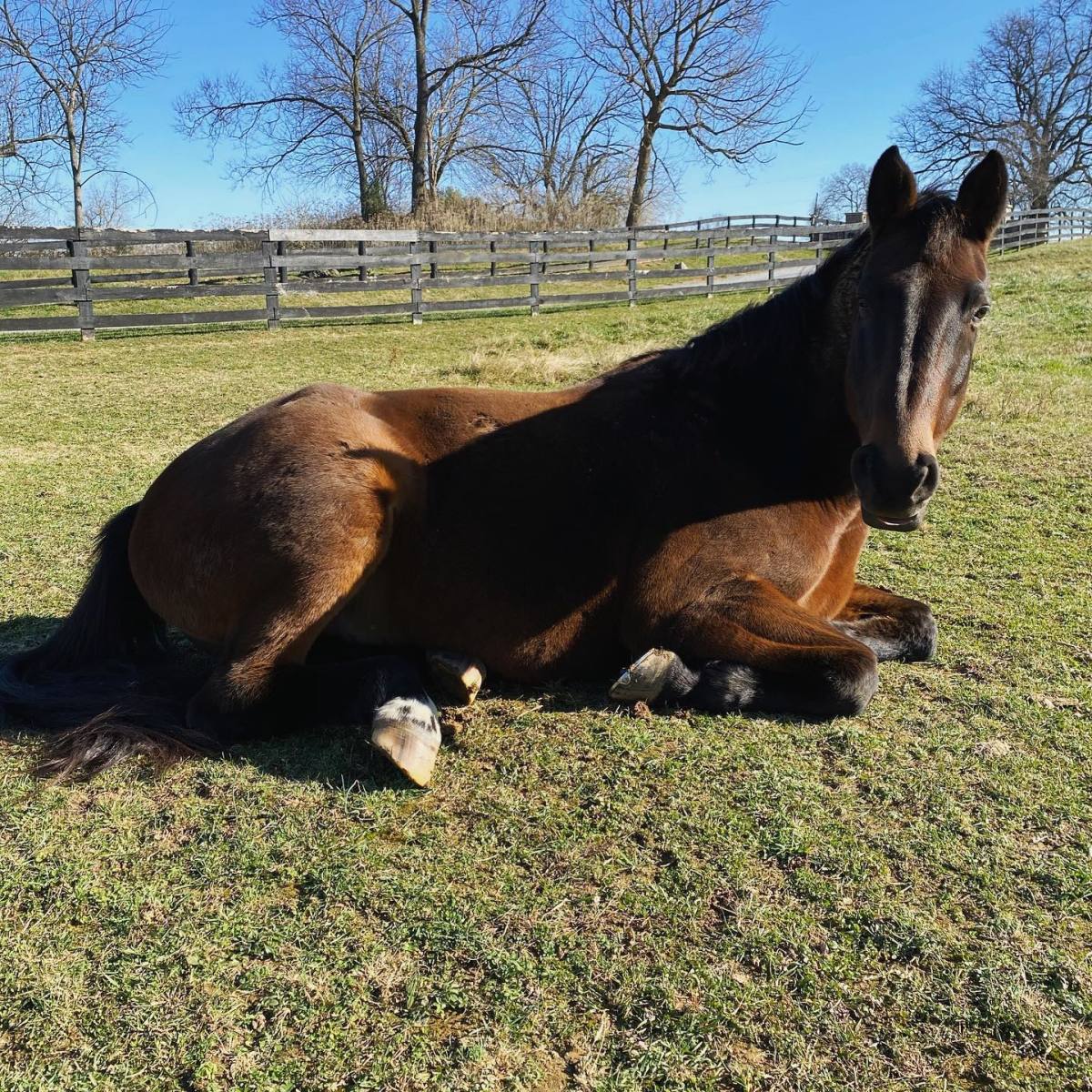
Sandy Oliynyk: Moving into competing and riding, what do you consider the highlights of your career so far? And what’s your favorite memory?
[00:22:11] Tim Bourke: You’ll never be passing the finish line at a five star, will you? The highlights have been the Kentucky’s. They’ve been amazing. You know, it was real good to go crossings and compete at Burley. Unfortunately, we had a little blip on cross country and one of my stirrups fell off, so I lost a bunch of time getting my stirrup back. The horse still finished clear across country, but we had a ton of time faults because of it but, you know, going, going out here to Kentucky and competing at the top of the sport is just what it’s all about.
Sandy Oliynyk: And do you have a routine before a competition?
[00:22:53] Tim Bourke: The girls are giving me grief about this one. But, cross country morning, I’ll usually go in the tack room and [00:23:00] get a couple of blankets out and have a snooze before I go cross country. They usually have to wake me up to get me on my horse, but it’s, how I deal with the nerves of it.
[00:23:08] I have a little nap and, you know, I’m a little bit different. I don’t get wild about it. I’ll usually have a pretty good breakfast in the morning and, and then try and chill out. I’ll have my plan for what I want to do. And I might walk around a little bit at the cross-country, especially if the footing’s anyway poor at all, I’ll walk, I’ll know where people are going to be where the tracks are going to be. I’m fanatical about trying to find good footing. So, as I’m going around, my last walk round is usually to try and find where I want to put my horse’s feet every step of the way around in an ideal world. If I’m late enough in the day, I’ll try and go and have a snooze and, get ready to go and get on and get going.
Sandy Oliynyk: So, how do you stay mentally focused? Especially, say, [00:24:00] during cross country day when it is so long.
[00:24:03] Tim Bourke: I think the biggest thing is to know your own plan and being brave enough to stick to it and not change. Like, obviously if there’s a specific question on course that’s causing a lot of trouble, you might have to go take another look at it and make sure that the plan you have is not suicidal.
It’s not where everyone’s running into bother. But most of the time I’m pretty confident about having a plan and sticking to it and not changing. I think you can get caught up in listening to what everyone else is saying about the course and you know, what what’s good for their horse might be good for yours and will cause you to change your plan.
I think you’ve got to be pretty strict about sticking to your plan.
Sandy Oliynyk: What would you say makes you a strong competitor?
[00:24:56] Tim Bourke: Focus. Focus, I think. You know, I think we’re all in this for the same reason — to try and be as competitive as we possibly can. It’s not a sport that’s gonna make you rich, it’s a sport that you do because you love it. I think being successful in this industry and in this sport is earning enough money to be able to support what you want to do and putting good horsepower underneath you, you know?
Making yourself competitive, taking as many lessons as you can, always getting help, always trying to improve yourself all the time, and looking back on your results and going, well, this was good enough and this wasn’t good enough, and how can I improve this? And, you know, looking at the long-term goals, rather than just, just that one short-term goal. I think that’s hugely important.
Sandy Oliynyk: And what, what are your other interests besides riding?
[00:25:57] Tim Bourke: There’s not too many of them. We’re fairly driven by these horses. I watch a little bit of sports. I like watching the NFL, getting into the season of football right now. The six nations rugby is on and Europe. So, I listened to that yesterday on the radio on the way to the show.
And that’s about it. We’ve got a little boy. He’s four this year. So, he starting to come through, we spend a lot of time together and I’m sure he’ll drag me into all different sports, but we’ll see where we go.
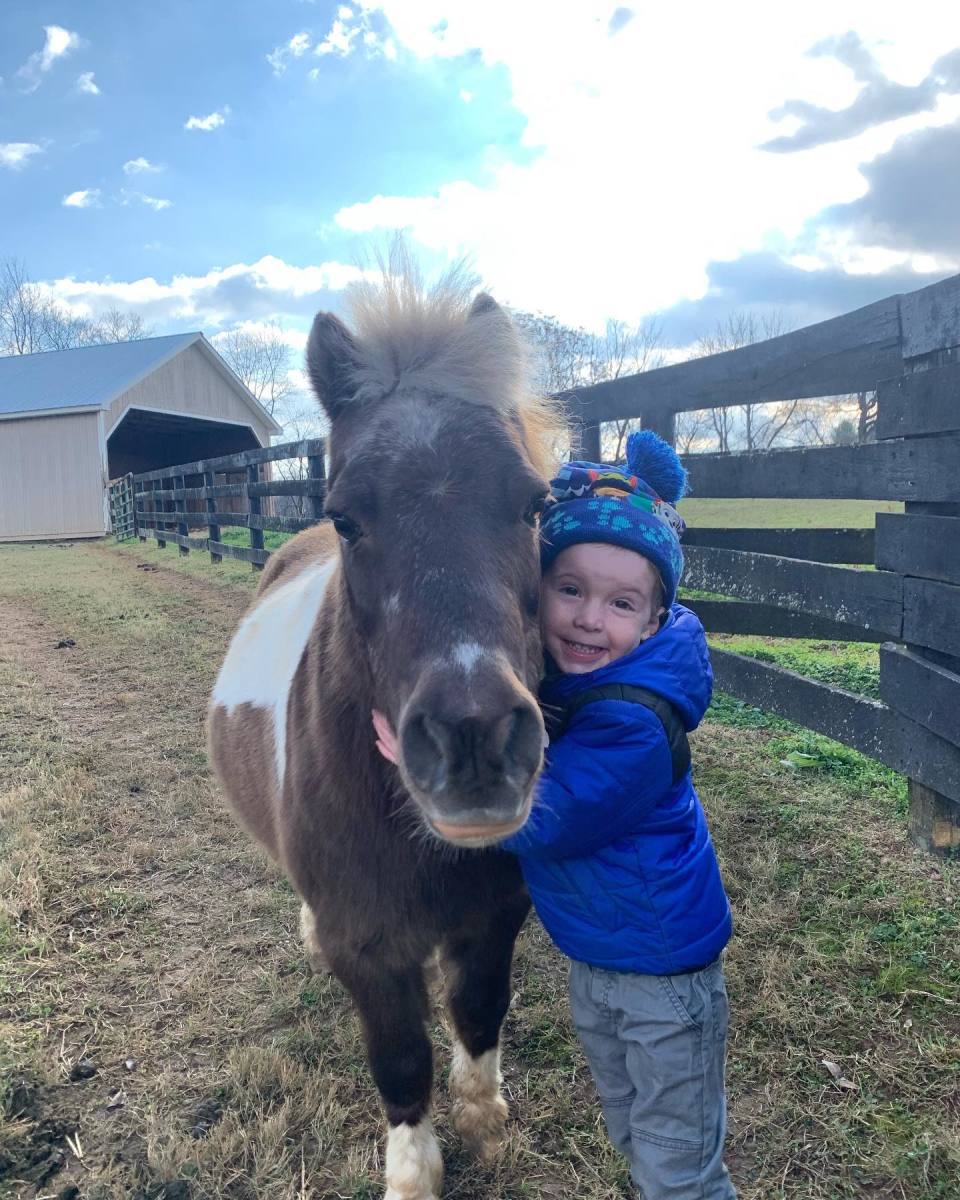
Sandy Oliynyk: I was looking at your Facebook page and it looks like he’s interested in horses a little bit?
[00:26:35] Tim Bourke: When the mood strikes him, yeah. We’re not terribly pushy. I don’t mind if he doesn’t ride, of course I love it if he does. You ask him if he wants to ride his pony, if he says no, that’s fine. That’s not a big deal. We’re not going to push it too much, but you try to make it as fun as you can.
He wants to be out there. He’s a barn rat, he’s never out of the barn. The girls are all real good with them. He’s a handful that kid.
Sandy Oliynyk: And final question — What are your future plans or goals?
[00:27:06] Tim Bourke: Oh, my God. I don’t know. We’re working real hard on just improving the quality of the horses that we have and putting ourselves in situations that… you know, you get to the top of the sport, you do it with multiple horses, not just one. So if, if you end up having a blip along the way, at least you’ve got some horses coming through and you’re not having to start all over again from scratch. Personally, I’d love to get back to the five star level and cruise around a bunch more and maybe get on some teams.
Sandy Oliynyk: Well, thank you very much. I really appreciate your taking time to speak with me this morning.
[00:27:50] Tim Bourke: Absolutely. No problem.
Sandy Oliynyk: Thanks for listening to this week’s episode with Tim Bourke and a big thank you to the sponsor of this week’s episode, Kentucky Performance Products. Learn more at kppusa.com. You can subscribe to the Practical Horseman podcast on Apple podcasts, SoundCloud, Stitcher, or wherever you get your podcasts. While you’re there, please rate and review the show. I’m Sandy Oliynyk, you’ve been listening to the Practical Horseman podcast.
Listen to the podcast with Tim Bourke here.






